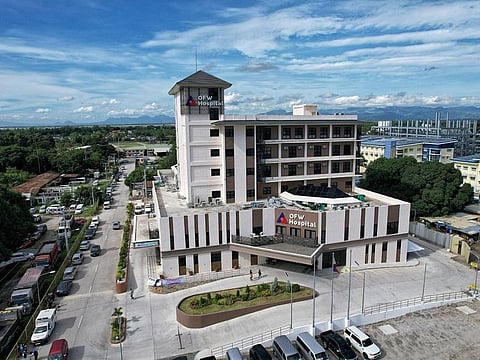Philippines: Free services at OFW Hospital, what you need to know
Facility sets high standard of care for overseas Filipino workers, dependents

Manila: Sixty-eight-year-old Stanley Martin, a retired Filipino engineer who spent over three decades working in the Middle East, recently experienced firsthand the quality of care at the Overseas Filipino Worker (OFW) Hospital in Pampanga, about 75km north of here.
Seeking treatment for a cholesterol issue, Martin was impressed by the hospital’s efficient service.
From the moment he arrived, he was promptly attended to, with X-rays and blood work results made available before his consultation. The doctor promptly prescribed cholesterol medication.
“I was pleasantly surprised by the high standard of care,” Martin told Gulf News. “The hospital facilities are modern, and the staff treated me with genuine care, or ‘malasakit’ as we Filipinos say.”
Free treatment
The best part: Martin said the treatment was free.
How did he prove his status as a retired OFW? By showing his passport, with the old and existing visa.
Martin regularly still visits the UAE, Ireland and Canada and is familiar with healthcare in those countries.
“I would say that in the OFW Hospital, we’re at par with the services I've seen in the countries I've visited.”
$8.7-million facility
Officially known as the Overseas Filipino Workers (OFW) Hospital and Diagnostic Center, it is built on land donated by the provincial government of Pampanga, started initial operations in May 2022.
The hospital is a specialised medical facility dedicated to serving the healthcare needs of Filipino migrant workers and their families.
As the name implies, the primary beneficiaries of the OFW Hospital are:
Who funded it?
The 100-bed medical facility was built with funding by the Bloomberry Cultural Foundation, Inc. and Pagcor.
The 7-storey was built at a cost of 500 million pesos ($8.7 million) from Bloomberry with another 200 million pesos ($3.5 million) from Pagcor, which was used for medical equipment.
Health initiative
This initiative underscores the Philippine government's commitment to ensuring the well-being of its overseas workers, who significantly contribute to the country's economy through remittances.
BSP, the country’s central bank, stated that the full-year 2023 remittances accounted for about 8.5 per cent of the country's gross domestic product, as cash remittances coursed through banks reached $33. 5 billion in 2023, an all-time high.
Features of the OFW Hospital
Specialised services: The hospital provides medical services tailored to the specific health needs of OFWs, including general medicine, surgery, dental care, and mental health services.
Accessibility: Designed to be accessible to all OFWs and their families, the hospital aims to reduce the burden of healthcare costs and improve the overall health outcomes for this demographic.
Comprehensive care: In addition to medical treatments, the hospital offers preventive care services, health education, and support programs to ensure the holistic well-being of OFWs.
Research: Apart from delivering medical services, the hospital strives to take the lead in research initiatives focused on the prevention, management and treatment of occupational diseases afflicting OFWs.
Services Offered
The OFW Hospital provides a range of healthcare services, including: • Outpatient services: General consultations, diagnostics, laboratory, and imaging. • Inpatient care: For those requiring hospitalisation. • Pre-employment medical examinations: Required for OFWs before deployment. • Medical repatriation: Assistance for OFWs needing to return to the Philippines for medical treatment. • Teleconsultations: Online consultations for OFWs abroad. • Ambulance services: For patient transport. • Malasakit Center services: Facilitating access to government assistance programmes. • Intensive care and neonatal care: For critical cases.
Location
It is located on a 20,000-sqm property (2 hectares) in San Fernando City, in Pampanga.
Timeline of the OFW Hospital & Diagnostic Center
2017
Initial proposal: The idea of an OFW-dedicated hospital was first proposed, highlighting the need for a healthcare facility that caters specifically to the unique needs of overseas workers.
2019
Legislative support: The House of Representatives approved House Bill No. 9205, which mandated the creation of the OFW Hospital and Diagnostic Center.
2020
Groundbreaking: The ceremonial groundbreaking for the hospital took place, marking the official start of the construction phase. This event underscored the government's commitment to the project despite the challenges posed by the COVID-19 pandemic.
2021
Construction: The construction of the hospital continued, with significant milestones achieved in the building’s development. The project faced delays due to the pandemic, but efforts were made to expedite the construction process.
2022
May: The hospital officially opened its doors to patients, as it was partially operated, offering limited services, focusing on essential medical services and diagnostics.
2023
January: The Department of Migrant Workers (DMW) takes over the hospital's operations from the Department of Labor and Employment (DOLE). The OFW Hospital became fully operational. The hospital was equipped with state-of-the-art medical technology and staffed by healthcare professionals trained to address the specific needs of OFWs.
March: The Department of Migrant Workers (DMW) joins forces with the University of the Philippines - Philippine General Hospital (UP-PGH) to boost healthcare services for overseas Filipino workers (OFWs) and their families. The agreement between the DMW and PGH seeks to elevate the standards of care at the hospital.
September: Senate Bill 2297 filed to enhance healthcare services for OFWs and their families by institutionalising the existing OFW Hospital and Diagnostic Center. The bill, filed by Senator Christopher “Bong” Go, seeks to assure funding for the maintenance, operation, staffing and equipment of the hospital. It also provides for a dedicated OFW ward in every Department of Health-retained hospital across the country as provided in Senate Bill No. 2414.
How to book an appointment
Sign up for the Daily Briefing
Get the latest news and updates straight to your inbox



